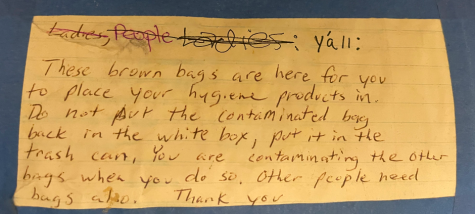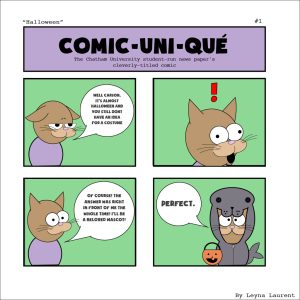The need for all-gender inclusive restrooms at Chatham
November 19, 2021
Chatham University has been a pioneer in college equality for non-binary and transgender students since it opened to all genders in fall 2015, but a large source of inherent inequality still remains: gendered bathrooms.
It doesn’t take long before coming across a restroom labeled “Ladies” on campus. While this is not of consequence to most cisgender women — the majority of students on campus — it should be.
If Chatham is to uphold its own standards for equality, gendered bathrooms must be removed. Separate spheres have long been an issue of importance to anyone but cisgender people. Why is Chatham, a university that prioritizes respecting people from all walks of life, continuing this antiquated narrative of gender binaries?
Not only do gendered bathrooms inhibit the comfort and safety of non-binary and trans people by enforcing a gender binary, they also encourage the idea that cisgender men must be kept separate from women because of sexist fears that men cannot control themselves. The way to prevent sexual violence on campus is through education and the Green Dot initiative, not through separation and fearmongering.
If we are to move forward as a campus and as a society toward equality, then we must do away with our own overlooked prejudices. These gendered bathrooms only lead to further confusion and discrimination.

In Coolidge Hall, there is a women’s restroom on the first floor near C130; the middle stall of this bathroom has a note about disposing of sanitary products that has served as a forum on gender. “LADIES,” it says, which has been crossed out and replaced with “PEOPLE.” That’s been crossed out, too, and replaced with, “LADIES.” The word was crossed out again and ultimately replaced with, “Y’ALL.” Each of these words was written in different handwriting, presumably by a new person each time.
This debate over who can use the ladies’ restrooms only causes strife among Chatham students instead of being a dialogue that brings us closer together. It’s important to acknowledge the impact this gender-exclusive decision has on the people who identify as male, as well.
Students and faculty should not have to spend time hunting down a gender-inclusive restroom. College is a time for self-discovery, not a bathroom witch hunt.
While the existence of the ladies’ rooms is problematic for men, the existence of both ladies’ and men’s rooms is incredibly unwelcoming to non-binary people. If a non-binary person toured here, they would hear golden promises of acceptance — only to see physical evidence of the outdated beliefs no one has challenged with women’s and men’s restrooms sitting proudly in Carriage House and the Chapel. The gender-neutral bathroom is tucked away in a separate room in Carriage House, as if it were a problem.
It is wonderful that students have access to some gender-inclusive bathrooms on campus, as this was an improvement fought for diligently in years past in the name of inclusivity. However, today, the options are unnecessarily limited and demand updating.
The solution to this is simple: remove the labels. The only thing keeping these facilities from being usable by all students is a label. No extensive renovations or construction needs to be done, just a label being changed.
Restrooms with gendered language only serve to inspire confusion and anxiety. Anyone who does not clearly conform to one of the gender binaries is left in the dark, and anyone trying to discover their gender identity is forced to constantly adapt.
This ignorance cannot continue on campus. We as a community must welcome everyone with no exception or we cannot claim to be an inclusive place to all. Chatham integrated to all genders in 2015 but still holds archaic practices that serve only to divide and distress.
LETTERS TO THE EDITOR
The Communiqué welcomes readers to submit letters to be considered for publication. Send your reactions to stories, thoughts on Chatham University and whatever else is on your mind to opinion editor Abbey Sullivan ([email protected]).







Dr. Ushuaya Castillo • Nov 27, 2021 at 11:46 pm
Well written! I’m hopeful that as long as more people call attention to our society’s outdated beliefs about gender, the sooner we can start accepting everyone as they are, no matter how they present themselves. It would be incredible if Chatham were to keep pioneering their gender equality policies and consider student’s opinions about gendered bathrooms!